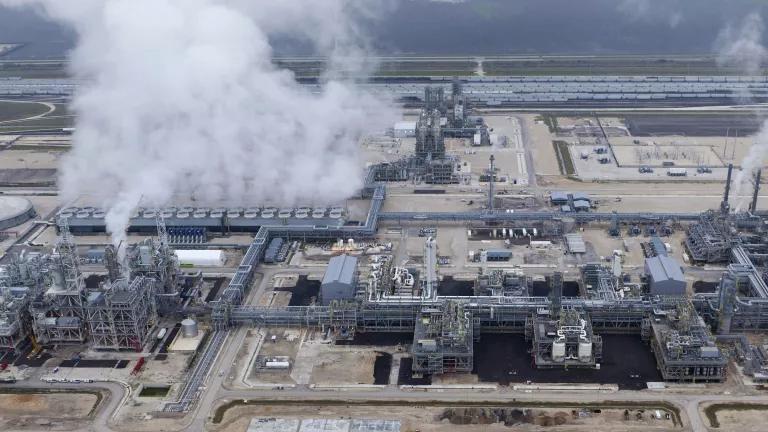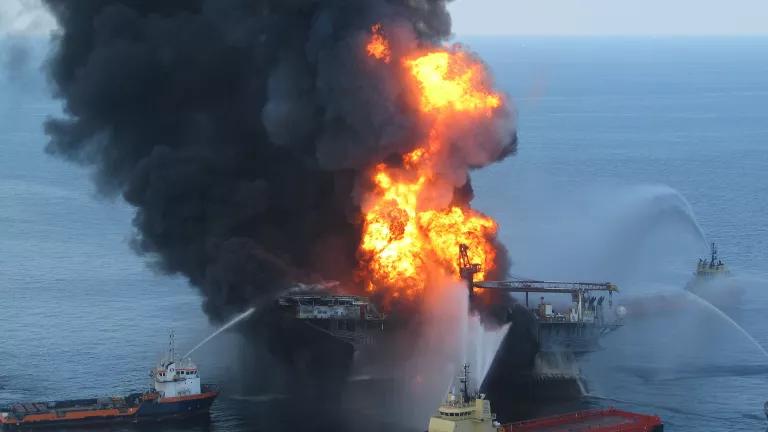With fracking already underway in 30 states and advancing at a breakneck speed, safeguards have not been adequate to protect communities, public health or the environment. I’ve seen the damage from the oil and gas industry’s unfettered advance firsthand. My conversations with people whose lives have been dramatically impacted were heartbreaking and continue to inform our work to protect communities from the dangers of this controversial practice. Nearly everywhere that this heavy industrial activity is operating, residents have reported contaminated drinking water supplies, heavy traffic, polluted air and a wide range of other impacts. From town to town, unfortunately, the stories we hear are all the same.
That’s why NRDC is opposed to expanded fracking nationwide unless and until sufficient safeguards are in place. Unfortunately, despite the fact that fracking continues to spread like wildfire; we’ve yet to see comprehensive safeguards like this enacted anywhere—at the state or federal levels. And that’s not surprising since the oil and gas industry has tremendous power. At the same time, thorough scientific analysis of the risks presented by fracking to human health and the environment are incomplete. As we watch the contamination of air, water and land resources increase, and climate pollution accelerate at an alarming pace, we need to move away from fossil fuel extraction, rather than rush to embrace it. We need to take the time to assess, understand and respond to the threats of fracking, rather than continue the rush to extract natural gas at the risk of our safety and future.
In places like New York, where fracking has not been made legal, we have an opportunity to learn from the mistakes we’ve seen unfold around the country and avoid putting residents at risk in the first place. Working with a wide coalition of community and environmental groups there, we’ve thrown our efforts behind advancing a moratorium to give the state the time necessary to thoroughly evaluate fracking’s risks before determining how to proceed on the proposed industrial process.
Unfortunately, not every state has gotten that chance. Many people are already exposed to risks from fracking run amok because it’s legal and/or happening in their states right now. So while we advocate for the proper scientific reviews of fracking, its dangers and protections, we must also work to protect people where it currently poses the risk of threatening their health.
This means, immediately, in Illinois, Ohio, Colorado, California and dozens of other states, passing laws that put in place protections against this urgent threat, which guarantees citizens’ rights to protect themselves and their communities. Among other things, citizens should have the right to know what chemicals frackers are using in their backyards. They should have the right to participate in public review of proposals to frack. They should have a right to require companies to follow standards that protect their communities and the environment from known risks and dangers. They should have access to courts to enforce the law where governments are unwilling or unable to do so. And they should be able to take their futures into their own hands, so they can say “no” to fracking in their communities if the residents don’t want it there.
Of course, the oil and gas industry disagrees, as if the right to endanger citizens and communities is essential to our economy. And we often need to employ a variety of means to fight back against this powerful opponent.
Take, for example, our recent work in Illinois. Right now, fracking is already legal there. Anyone with $100 can get a permit to frack after a 48-hour waiting period. And there are currently almost no rules in place for them to follow after they get it. Further compounding this threat is the fact that a lease rush has been underway for some time, and there are indications that the first frackers have already broken ground there.
NRDC fought hard for a moratorium in the state and we were disappointed when one failed to pass the legislature last year. In the aftermath of that defeat, a process to put fracking regulations in place took off, with strong involvement from industry. With that train moving fast, we decided we could not sit back and let industry write its own rules while fracking was already legal and posing an immediate threat. So—while continuing to support a moratorium in the state—our Midwest team felt a responsibility to ensure there was a seat at the table for the environment and public health when those regulations were drafted.
The resulting pending regulatory bill is not the comprehensive sufficient safeguards we’ve been calling for, and won’t make fracking “safe.” We believe the state should enact a moratorium on fracking unless and until the threats are fully analyzed and appropriate safeguards identified. But the bill would provide some important, immediate protections against an existing and legal threat that otherwise are not in place to meet the present realities of legal, unrestricted fracking. These protections would force frackers into the bright light of the law with tough construction standards, the burden of liability if water is impacted, mandated water testing, and most importantly, the ability for the public to take part in permitting processes to push back on drilling in their area and access to the courts to enforce the law.
NRDC has always stood up for people in harm’s way. That’s what we’re doing—and will continue to do—in Illinois and on fracking nationwide, any way we can. In the meantime, we will continue fighting every day to advance clean energy that can’t spill or contaminate our drinking water, so we can move away from dirty fossil fuels as quickly as possible.



